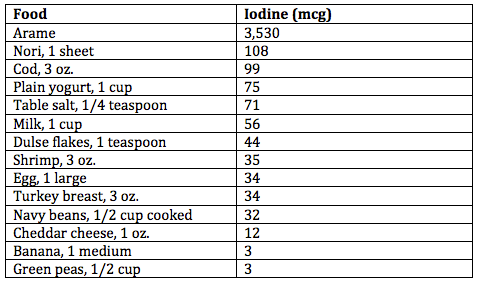Iodine is a mineral that receives very little media attention, but is absolutely essential during pregnancy and breastfeeding to support proper baby’s proper brain development. According to a new policy statement by the American Academy of Pediatrics released in June 2014, a full one-third of pregnant women in the US are marginally iodine deficient.
Consequences of Iodine Deficiency During Pregnancy
Iodine is required for the production of thyroid hormones, which are vital for a baby’s brain development. Severe iodine deficiency results in irreversible cretinism, but milder deficiencies in iodine can result may adversely affect brain development though to a much smaller degree.
Increased Susceptibility to Environmental Toxins
Iodine deficiency can also increase your susceptibility to environmental toxins like perchlorate. Perchlorate is used in rocket fuels, explosives, and propellants, and occurs naturally in the southwestern US. Perchlorate exists in about 4% of US public water supplies and has been detected in cow’s milk. Human exposure to perchlorate is thought to be widespread. Perchlorate competitively inhibits iodine uptake by the thyroid. Lower iodine status and higher urinary perchlorate have been associated with lower thyroid function.
Iodization of Salt
In 1924, the iodization of salt began and helped to virtually eradicate severe iodine deficiency in the US. However, with the increase in processed food intake in the US, women are getting less iodine. The salt used in processed foods is usually not iodized. In addition, many people are turning to sea salt, which is not iodized, due to valid concerns about the processing of most conventional table salt. This processing may include the removal of trace minerals and the addition of anti-caking agents like aluminum. Sea salt on the other hand contains trace minerals including low levels of naturally occurring iodine, but levels of iodine are much lower than that in iodized salt.
Who is at the Highest Risk for Iodine Deficiency?
Vegetarians and vegans are at higher risk for iodine deficiency, as fish, meat, and eggs are eliminated as iodine sources. If you are vegan, and don’t eat iodized salt or seaweed, and don’t take a prenatal vitamin with iodine, you are at considerable risk for iodine deficiency. Read on for ways to prevent and address inadequate intake of iodine.
Daily Requirements
Adult women require 150 mcg iodine daily, while pregnant and breastfeeding women need 220 mcg and 290 mcg, respectively. The American Academy of Pediatrics recommends that women take a prenatal vitamin containing 150 mcg iodine during pregnancy and breastfeeding in order to prevent iodine deficiency.
Not all prenatal vitamins contain iodine, so it’s important to check the label of your prenatal vitamin for iodine. If you are taking a prescription prenatal that doesn’t have a label, be sure to contact your pharmacy to obtain the iodine content.
Prenatal Vitamins with Iodine
Here is a list of my favorite prenatal vitamins, all of which contain iodine:
Rainbowlight Prenatal One Food Based Multivitamin: 150 mcg iodine
Rainbowlight Organic Prenatal Multivitamin: 150 mcg iodine
Vitamin Code Raw Prenatal: 150 mcg iodine
Metagenics Wellness Essentials for Pregnancy: 150 mcg iodine
Thorne Basic Prenatal: 150 mcg iodine
Food Sources
Seaweed is one of the best food sources of iodine along with fish, but you can also get iodine from dairy products and meat (because iodine is often added to animal feed). Fruits and vegetables also contain iodine in varying amounts depending on the iodine content of the soil where they were grown. The iodine content of most foods including seaweed varies considerably based on growth conditions.
Eat Seaweed
The iodine content of seaweed can vary considerably, but including a small amount of seaweed weekly to a few times per week can help you meet your iodine requirement. Here are some ideas for ways to incorporate seaweed into your diet:
- Snack on some nori.
- Soak arame in cool water to reconstitute and sprinkle on salads.
- Try out the Triple A salad with arame, almonds, and avocado.
- Use dulse flakes instead of regular salt to season soups, stirfries, and eggs.
Caution if you have Hashimoto’s
If you have Hashimoto’s thyroiditis, iodine supplementation and/or adding seaweed with very high iodine content may actually worsen the disease though reports are mixed. That being said, it’s still important to meet daily iodine requirements (without overshooting the requirement) especially during pregnancy through a prenatal vitamin and food sources including lower iodine seaweed like nori or dulse flakes.
References
1. Iodine Deficiency, Pollutant Chemicals, and the Thyroid: New Information on an Old Problem. Pediatrics. 133(6):1163-1166.
2. Linus Pauling Institute: Iodine. Available at: http://lpi.oregonstate.edu/infocenter/minerals/iodine/. Accessed July 10, 2014
3. National Institutes of Health: Iodine Fact Sheet. Available at: http://ods.od.nih.gov/factsheets/Iodine-HealthProfessional/. Accessed July 10, 2014.
4. Dr. Andrew Weil: Why Buy Iodized Salt? Available at:
http://www.drweil.com/drw/u/QAA400874/Why-Buy-Iodized-Salt.html. Accessed July 10, 2014.
5. Examine: Iodine. Available at: http://examine.com/supplements/Iodine/ – summary1-0. Accessed July 10, 2014.

Great article! Really interesting that iodine deficiency can increase susceptibility to environmental toxins. Seems like a great idea to have iodine levels measured especially if risk for deficiency is high.